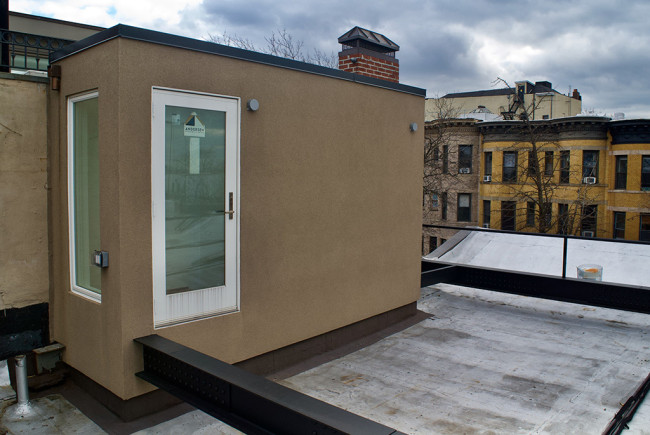How to evaluate different types of NYC contractor bids when you're renovating
- The ideal estimate is an end-to-end fully transparent cost for the work
- Your architect can help you compare bids that use different pricing strategies

It's helpful to understand the three basic types of estimates for construction work.
Hispanolistic/E+ via Getty Images
I'm doing a fairly comprehensive condo remodel and am talking to contractors. Some quotes are for an all-in price that includes plumber, electrician, and general supplies. At the other end of the spectrum are quotes for labor only, leaving me to supply everything and find plumbers and electricians myself. What’s the best way to navigate this?
There are several ways to produce estimates for an apartment renovation and it can be difficult to compare bids, our experts say. The ideal estimate is one that includes an all-in end-to-end cost for full transparency, particularly if you have never done an apartment renovation in New York City before.
When you are asking for bids, it's important to be as specific as possible about the scope of the project and materials that will be used. If you receive multiple bids with different pricing strategies, your architect can help you figure out how to compare them. It's also helpful to understand the three basic types of estimates for construction work so you can make an informed decision about which is best for you.
What are the three basic types of estimates for work?
You typically see bids called "cost plus," “time and materials,” or “lump sum,” says Anna Karp, CEO and co-founder of Bolster. In most cases, design costs are separate. Cost plus estimates account for supplies, equipment, and subcontractors as well as a separate amount for the contractor's profit. This is usually around 15 to 20 percent. With a cost-plus contract you can usually finalize the scope of the project as it progresses, so there's some flexibility but they can be very open ended, says Peter Holtzman, founder and principal architect at Bespoke Architecture.
A time and materials contract is similar to the cost plus—the difference is in the way a contractor factors for profit. "In a time and materials contract, the contractor adds a markup rate to the costs. In a cost-plus contract, the contractor bills for actual costs plus a separate amount for profit," Karp says.
A lump sum contract is a fixed price for a job and is the most common for residential renovations in NYC. For this type of bid you need to provide explicit specifications for the work in order to avoid changes that can increase the budget. "Most folks at the lower and middle end of construction really want to have some measure of certainty so lump sum is the most common," Holtzman says.
"My advice would be to steer clear of any contractor that hides, obscures, or doesn’t include information or well-known line items in their estimates," Karp says. This includes; third parties, like expeditors and specialist teams that may be needed; subcontractors, like plumbers and electricians; hardware including cabinets, faucets, and lighting fixtures; labor; insurance; project management; general liability; overheads; and profit.
Evaluating different bids for renovation work
The all-in price is similar to the lump sum pricing strategy. "An all-in-price arrangement provides convenience and a level of accountability for the project budget," says Jeffrey Reich, a partner at Schwartz Sladkus Reich Greenberg Atlas.
Whereas, he says, moving forward with an estimate that relies on you hiring your own plumber, or electrician, and buying materials might be more appealing to an owner with some renovation experience.
A lot comes down to your level of comfort with the construction process. "As the homeowner it’s not your job to source your subcontractors and specialists—the most you would be responsible for is hiring an architect and then contracting your general contractor separately," Karp says.
If you're being asked to provide relevant contacts for a plumber and electrician, you are actually being asked to take on the role of the general contractor. Maryana Grinshpun, founder of Brooklyn-based architecture and design firm Mammoth Projects, says it's very unusual to do a gut renovation in NYC without a professional general contractor coordinating the project and holding the insurance. "No building would allow that," she says.
Remember, an estimate that shifts logistics and subcontractor sourcing to you will typically be more affordable than other bids, but that's because you're taking on a bigger role in overseeing the project. "Construction is not complex but it's very complicated—there are a lot of moving parts," says Grinshpun. "Every single trade needs to be coordinated and needs to turn up at exactly the right time, so the next trade can come in and another trade can come back," she says.
Without a general contractor, you may also not get the quality of work you are expecting. Consider this: A general contractor is a source of regular work for a subcontractor and as a result they are more likely to behave reliably for them—that is turn up to the site on time, and do the work professionally. That puts the one-off client at a "tremendous disadvantage for subcontractors," Holtzman says.
Keep in mind, the work of a plumber or electrician is also a specialist trade. You may not know what to look out for when vetting them, Karp says. "General contractors that are reputable have their own vetting processes, and while buying materials directly is risky, finding your own trades for a big renovation is extremely risky," she says.
Another risk involved in sourcing your own materials is that you have less leverage than a contractor if there are supply or warehouse issues. Contractors also buy in bulk which often gives them a trade discount they can pass on. "Also, returns are often tedious and sometimes fixtures and fittings arrive broken," Karp says.
In some cases, you may want to hire a specific subcontractor or specialist, for example, an audio visual installation expert or someone to provide custom millwork. These will generally be costed separately and obviously add to the overall budget. Specialist contractors will need to coordinate with your general contractor to ensure their installations are done on time and on budget.
Getting help to establish the best bid
Most NYC renovations involve an architect in some capacity—either the building or the city will require it—unless the work is entirely cosmetic. If you're using an architect, they can often help you level the bids as part of their services. "Their role would be to help you understand disparities and select the best professional for the job—an architect wants to see their work built too," she says.
Holtzman does this routinely, breaking down the bids into specific line items and basic trades, like electrical, mechanical, painting, and carpentry. He encourages anyone doing renovation to get detailed bid drawings and specifications. The drawings you provide to the city for filings might be enough to get a permit but you need a lot more detail to accurately price out a job. "Materials are not specified in filing drawings, they have to be specified in bid drawings," he says. That includes the species of wood flooring, the tile, the type of doors, and which plumbing fixtures you'll be installing.
"The more specificity you can put into the drawings, the tighter the bids are going to be—there's going to be a smaller range [in costs] because there's less assumption about the project," he says.
If you own a co-op, you may face requirements that you hire the building architect or engineer at a personal cost to you. "The role of this building engineer or architect is to verify that all the work is up to the building’s standards," Karp says. The building's architect can also help you answer questions about the work you have planned and the estimates you've received.
If there's a circumstance where you are doing work without the oversight of an architect, Holtzman advises owners to get contractors to submit bids with as much detail as possible where items are broken down at the very least by by trade. "The more detail you can get the more points of comparison you have between one and the other," he says.
In this way you might see that one contractor has identified essential work that others have missed or you will be able to revise the scope of the work so it's within your budget.
One suggestion from Grinshpun is to produce a detailed worksheet for the entire project and ask the contractors you are considering using to fill it out. "So instead of you taking apart the contractors format you are saying "Use my format," so that you can compare apples to apples," she says. The danger with this approach is that you may miss something, so always ask the contractors if there are omissions, she says.
You Might Also Like



























